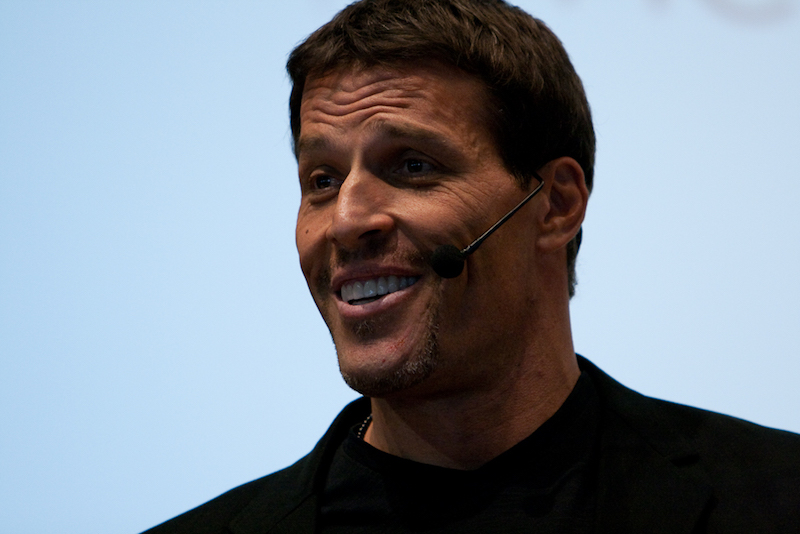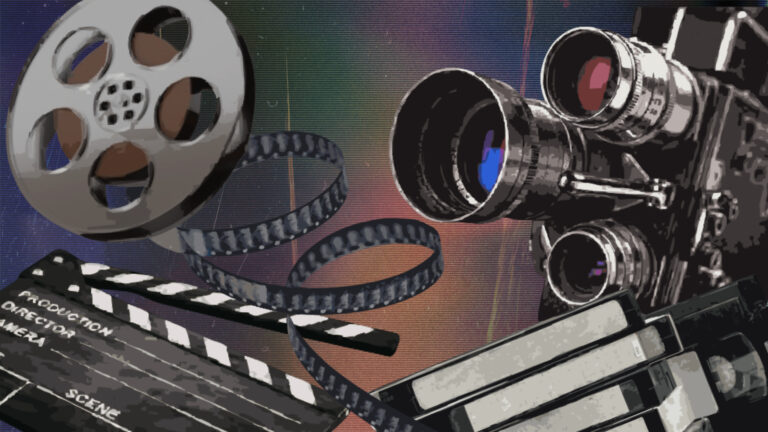Let’s imagine you paid $5,000 to spend a week in a room with a thousand strangers to listen to a loud, foul-mouthed, larger-than-life character. Now let’s suppose you walked away saying it was the single greatest experience of your life.
This, it seems, happens all the time at Tony Robbins’s Date With Destiny seminar.
It’s the subject of a recent documentary titled I Am Not Your Guru, and to say the least, it’s hard to wrap my mind around it. In some ways, Tony Robbins is one more figure in the pantheon of therapeutic life coaches, which would include Tim Ferriss (The Four-Hour Workweek), Elizabeth Gilbert (Eat, Pray, Love), and to some extent, that favorite punching-bag of Reformed guys, Joel Osteen. In Tony’s case, he covers most of the topics we consider part of the good life: health, wealth, meaningful work, and meaningful relationships. He also has an immense amount of charisma and charm, even when dropping f-bombs.
Despite the film’s title, Robbins is precisely that: a self-help guru in the world of therapeutic humanism—and an especially fraught one at that. Perhaps you’ve heard of him through last year’s coal-walking debacle, where dozens were injured during Robbins’s “Unleash the Power Within” workshop. Make no mistake: his world is thoroughly secularized and self-interested, and he takes no interest (at least in his published work) in anything beyond self-improvement and “self-actualization.” Which is what makes it all the more surprising that we can learn a few things from him.
Stoicism with a Tan
Tony starts Date With Destiny by digging into the sources of people’s troubles. Early in the documentary, he asks a girl what she hopes to get out of her week. She wants to make healthier choices about food. Why? he asks. To be healthy, she says. To live a good life. He probes more. Soon, she’s near tears, describing a broken relationship with her drug-addicted father, whom she blames for much of the hardship in her life.
Here, Tony challenges the girl to not only blame him for the bad things he’s passed along for her—insecurity in her search for love and acceptance—but for the good things. His bad parenting has made her more independent, more fierce, more determined. She should be grateful for the whole thing: his trouble-making, the gaping hole in her, because without all of this she wouldn’t be who she is and where she is.
Date With Destiny is stoicism with a tan and ginormous pectoral muscles.
His point (if I understand it) is this: If we live our lives regretting our past, wishing it were different, we’ll never live fully in the present. We’ll remain beholden to emotions that wish for a kind of satisfaction and resolution that’s long-gone. Instead, embrace the reality. Welcome it. It brought you to where you are, and by embracing and accepting it, you can move toward a better future.
It’s stoicism with a tan and ginormous pectoral muscles. Embrace the pain of the past, accept the vulnerability of the present, and be brave about your future.
Dealing with Past, Present, and Future
There’s a powerful scene where Tony invites people in the audience to stand up and admit if they’re suicidal. A girl stands up, and Tony stands toe-to-toe with her as she tells her story. At first he’s jocular, pressing her not to lie to him, not to be weak. She goes on to tell a horrific story of a lifetime of sexual abuse. It’s a powerful moment, and Tony simply listens. He weeps. He stands with her in her sorrow, and tells her he loves her. He then gathers people around her, and asks her to find men in the crowd she wants to trust. “These are your uncles,” he says. He charges them to act as guardians for her. The crowd ends up raising money to send her for help, and to send her for training so she can help other victims. It’s moving and redemptive.
Date With Destiny moves on to relationships. During this part of the documentary, Tony asks a woman to share her “vision statement” for her relationship. She reads off a long, semi-poetic, semi-coherent, semi-erotic statement. He then asks the man to stand up and read his own. The guy stumbles, and Tony cuts him off. He calls the guy out into the aisle, asks how often they make love, and the guy admits it’s about twice a month. (This is a bit shocking after hearing the long vision statement from his wife.) Tony quickly asks about the guy’s parents. Dad was feminine, Mom was domineering, so Tony says, “You were rewarded for being weak.” Soon, Tony has him roaring like a lion into a microphone. Apparently, the documentary reveals, this solves their marital crisis.
By the end of the week, people are working on defining what they’re most passionate about, and how they’re going to devote their lives to it. The whole week seems to demand that you reckon with your past, be honest about your present, and be determined about your future.
What Can Christians Learn?
If you can handle the language, Date With Destiny is worth watching. There’s something compelling about the message that you can change your life for the better. And it’s a message from which Christians can learn a thing or two.
I’ve found, especially amongst the YRR crowd—are we still Y, by the way? Someone ask Collin Hansen—that there’s a casual dismissiveness of anything self-help related. We have our own brand of stoicism based on the sovereignty and providence of God, and it’s mostly applied as a brace for suffering. It’s suspicious of good things, and can take on a Debbie Downer quality: Pursue pleasure if you must, but know suffering and death lie right around the corner.
Part of the motivation is theological (there is truth to it), but another part is self-protective. Acknowledging that we want change, that we want a thriving life and a good marriage and meaningful work, exposes our vulnerability. It cracks open the possibility of disappointment. Better to expect the worst and brace ourselves, than to try and fail.
If Reformed folks aren’t careful, we can adopt a posture aligns us more with Buddhism than the Bible.
So we have great literature about how God is more satisfying than stuff, and how not to hope in anything that moth and rust can destroy, and general suspicion about finding satisfaction in life. (Trillia Newbell’s new book, Enjoy, is a notable exception.) If we’re not careful, though, that posture aligns us more with Buddhism than the Bible. There are an awful lot of feasts in the Bible, and there’s much in the Wisdom books about living a satisfying life. The Bible is not against living boldly, embracing dreams, and making a Vision Board. It is against holding those things out as the end-all-be-all of human existence because it is against idolatry in general. Just as we don’t abandon sex because it can be an idol, we shouldn’t abandon hopes of meaningful living.
Folksy, Flashy Wisdom
In some ways, what Date With Destiny holds out is folksy wisdom in a flashy package. My great aunt Jenny used to say, “You can’t relive yesterday,” which strikes me as a Southern version of stoic philosophy, boiled down to four words. And wisdom might be the best category in which to place some of Tony’s teaching. The Bible’s wisdom literature isn’t law, and it isn’t primarily about moral lessons. Rather, it’s about the way the world works, and it offers pathways by which we can navigate relationships, money, business, and pleasure. Much of Tony’s work seems to fit into this world.
It also fits into the category David Benner calls “soulfulness” in his book Soulful Spirituality. We might be good Christians, Benner says, but we might not be good human beings. We might be perfectly saved and perfectly miserable.
Benner proceeds to distinguish spirituality from soulfulness. Spirituality is our religious life, practices, and convictions. Soulfulness is the “full expression of our humanity.” One might be completely out of touch with God in a spiritual way, but because of how they’ve come to see the world (due to their receptiveness to natural revelation), they live a life of richness and fullness. In other words, they’re soulful. They have a sense that there’s more to life than what appears, that generosity is rewarding, that all human life has dignity and worth, that dreams and ambitions can and should be pursued. They’re seeking a good life, relishing the goodness of creation, and finding a certain amount of joy.
Two Truths in Tension
Sometimes, Christians want to pooh-pooh this stuff, citing total depravity and the general idea that non-Christians are all secretly miserable. But I don’t think that’s intellectually honest. There is goodness to be found in creation, in love and work and the pursuit of healing, even if you don’t realize that all of the goodness is a divine gift. We can affirm this while also believing there is a restlessness in the heart that can’t be satisfied apart from God. Both of these are true.
Ultimately, if we’re only dismissive of the Tony Robbinses of the world and of the satisfaction his way of life provides, we hurt our own witness. We sound miserly, shouting, “You’re secretly unhappy!” to many people who are, generally speaking, quite happy.
Christianity offers a bigger story in which Tony’s work fits, revealing both a deeper brokenness and a deeper healing.
The proper Christian response to Tony Robbins isn’t to dismiss his work or his results, but to point out the reasons his work needs to exist in the first place—to point to the brokenness in all. Christianity offers a bigger story in which his work fits, revealing both a deeper brokenness and a deeper healing. To say we can live meaningful lives is to acknowledge most of us don’t, and we can trace the reasons back to the fallenness of the world.
The question isn’t whether or not Tony gets results and improves lives. It’s whether his work is enough—whether he offers satisfactory answers to the brokenness of the world, and whether improving our own lives, while the rest of the world and the rest of history continue to suffer.
We should love common-grace wisdom, and we should love seeing it bear fruit in people’s lives. But we should love it as mere wisdom, and we should want more for our neighbors than the success of their Vision Board. We should also take joy in seeing people live more freely, embrace their gifts, and pursue their goals. We weren’t made to live with frustration, without dreams and goals, trapped in unhealthy relationships. As people who believe in a world that’s good, we should be glad when people find a little bit of that goodness, even while we remain at the ready to tell them where it comes from.
“The Most Practical and Engaging Book on Christian Living Apart from the Bible”
 “If you’re going to read just one book on Christian living and how the gospel can be applied in your life, let this be your book.”—Elisa dos Santos, Amazon reviewer.
“If you’re going to read just one book on Christian living and how the gospel can be applied in your life, let this be your book.”—Elisa dos Santos, Amazon reviewer.
In this book, seasoned church planter Jeff Vanderstelt argues that you need to become “gospel fluent”—to think about your life through the truth of the gospel and rehearse it to yourself and others.
We’re delighted to offer the Gospel Fluency: Speaking the Truths of Jesus into the Everyday Stuff of Life ebook (Crossway) to you for FREE today. Click this link to get instant access to a resource that will help you apply the gospel more confidently to every area of your life.


































